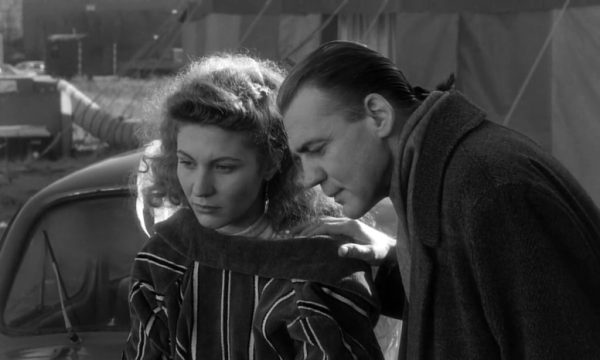Wings of Desire, 1987.
Directed by Wim Wenders.
Starring Bruno Ganz, Otto Sander, Peter Falk, and Solveig Dommartin.
SYNOPSIS:
An angel tires of his purely ethereal life of merely overseeing the human activity of Berlin’s residents, and longs for the tangible joys of physical existence when he falls in love with a mortal.
Wim Wenders has been a pioneer of German cinema for over 50 years from his early films like Alice in the Cities, Kings of the Road and The American Friend through perhaps his best known work Paris, Texas. Many cinemas across the UK are doing a retrospective season on the director including both his best known features and less recognised gems. The romantic fantasy Wings of Desire, which celebrates its 35th anniversary, is at the forefront of the season and remains perhaps Wenders’ definitive work.
The film, shot both in black & white and colour, tells the story of two angels watching over late Cold War Berlin prior to the fall of the Wall, and their interactions with the human world. Wings of Desire has been appraised by some as one of the best films of the 1980s and spawned the sequel Faraway, So Close! in 1993 and a US remake in the shape of City of Angels a decade later starring Nicolas Cage and Meg Ryan.
Perhaps the greatest credit that can be thrown at Wings of Desire is its sense of ambition, covering a multitude of spaces within the city and the thoughts of its inhabitants giving us a flavour of the mood in Berlin during such a tumultuous time. In spite of this we never lose sight of our two leads who, while being largely silent, guide us through this metaphysical journey.
The film, as with the likes of Paris, Texas, is a reflection on humanity and loneliness and the resilience of human spirit. As it reaches its final act and Bruno Ganz’s Damiel makes the leap into the human world, it becomes a celebration of humanity and the small everyday things we might take for granted as well as the power of companionship and love. The juxtaposition between the monochrome nature of the angels’ existence and the vibrant colourful world we occupy is stunning and is perhaps one of the finest examples of being able to blend the two harmoniously. Of course many of Wenders films are renowned for their visuals and cinematographer Henri Alekan helped to capture the light and dark of one of Europe’s most transfixing and beguiling cities at one of the most fascinating points in its recent history.
Bruno Ganz and Otto Sander do remarkable work without speaking for much of the film’s runtime, with Damiel gazing in awe at the potential of the world around him while the more distant Cassiel resolutely watches on; it is the relationship and difference between the two that makes this a fascinating film. Columbo himself Peter Falk has an extended supporting role as himself, revealed to have once been an angel, in a fun and welcoming departure from some of the film’s more sombre moments. Solveig Dommartin rounds out the principal cast as Damiel’s love interest Marion, a trapeze artist who is uncertain of her position in the world and finds solace in Damiel.
Wings of Desire remains a stunning cinematic achievement, even with its slightly abrupt ending. It sits near the top of an exceptional filmography from one of not just Germany but Europe’s most celebrated directors. It works as a time capsule almost to Berlin just before the fall of the wall and contains some incredible visuals and a melancholic and deeply touching tone throughout which is sure to smother up audiences in a warm blanket.
Flickering Myth Rating – Film: ★ ★ ★ ★ ★ / Movie: ★ ★ ★ ★ ★
Chris Connor















